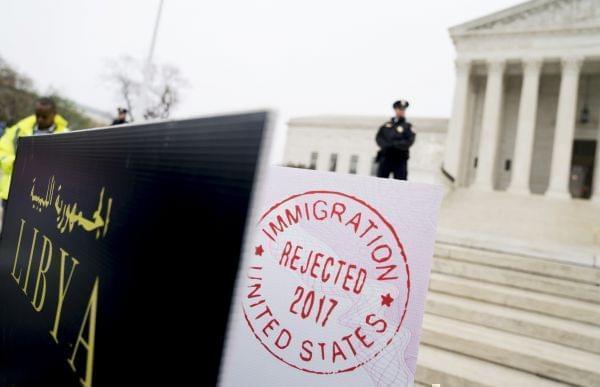In Big Win For White House, Supreme Court Upholds President Trump’s Travel Ban

Poster sized enlargements of passports marked as "rejected" by United States Immigration were on display April 25th, during an anti-Muslim ban rally, as the Supreme Court heard arguments about whether President Donald Trump's ban on travelers from several mostly Muslim countries violates immigration law or the Constitution. The high court upheld the ban in a ruling issued Tuesday (June 26). Andrew Harnik/AP
Updated at 11:51 a.m. ET In a 5-4 ruling that gave broad leeway to presidential authority, the U.S. Supreme Court upheld President Trump's travel ban, which barred nearly all travelers from five mainly Muslim countries.
The president's proclamation was "squarely within the scope of Presidential authority under the INA,'" the court wrote in its majority opinion, referring to the Immigration and Nationality Act.
"Today's Supreme Court ruling is a tremendous victory for the American People and the Constitution," Trump said in a statement. "The Supreme Court has upheld the clear authority of the President to defend the national security of the United States. In this era of worldwide terrorism and extremist movements bent on harming innocent civilians, we must properly vet those coming into our country.
"This ruling is also a moment of profound vindication following months of hysterical commentary from the media and Democratic politicians who refuse to do what it takes to secure our border and our country. As long as I am President, I will defend the sovereignty, safety, and security of the American People, and fight for an immigration system that serves the national interests of the United States and its citizens. Our country will always be safe, secure, and protected on my watch."
The court seemed to tip its hand at oral arguments in April, when a majority of the justices appeared ready to side with Trump. The court was ruling on what was the third version of the ban, which Trump has complained is a "watered-down" version.
The court allowed it to go into effect while the case was litigated, but the lower courts had ruled that all three versions either violate federal law or are unconstitutional.
Like the earlier two bans, Version 3.0 bars almost all travelers from five mainly Muslim countries, and it adds a ban on travelers from North Korea and government officials from Venezuela.
The court acceded broadly to presidential power. The majority opinion, written by Chief Justice John Roberts, noted that the INA exudes deference to the president. The executive order, he wrote, was more detailed than similar orders by Presidents Ronald Reagan and Jimmy Carter and defers to the president's power.
The only thing a president has to signal is that entry for people from various countries would be detrimental to the interest of the United States. The president undoubtedly fulfilled that requirement here, the court noted.
The president, Roberts said, has extraordinary power to express his opinions to the country, as well. The plaintiffs argue that Trump's past campaign and other statements about Muslims should be taken into account, but the majority said it is not the court's role to do that.
He added that the order was neutral on its face and the president was addressing a matter within the core of executive responsibility. Roberts signaled that the court was balancing not just statements of the president, but the authority of the presidency.
Sonia Sotomayor wrote a scathing dissent, and reaction to the ruling was swift.
"This ruling will go down in history as one of the Supreme Court's great failures," said Omar Jadwat, director of the ACLU's Immigrants' Rights Project, in a statement. "It repeats the mistakes of the Korematsu decision upholding Japanese-American imprisonment and swallows wholesale government lawyers' flimsy national security excuse for the ban instead of taking seriously the president's own explanation for his actions.
"It is ultimately the people of this country who will determine its character and future. The court failed today, and so the public is needed more than ever. We must make it crystal clear to our elected representatives: If you are not taking action to rescind and dismantle Trump's Muslim ban, you are not upholding this country's most basic principles of freedom and equality."
The rulingslso drew quick condemnation from Illinois Democrats.
Dick Durbin, the Senate’s Minority White, said in a statement that “the decision upholding President Trump’s Muslim travel ban fails to safeguard the principle of religious neutrality embedded in our Bill of Rights.”
U.S. Senator Tammy Duckworth said that history would judge the high court’s ruling harshly.
“The America that I know is not a nation that slams its doors on children and families fleeing barbarism or terror”, said Duckworth in a statement.
And gubernatorial candidate JB Pritzker used the ruling to refresh his criticism of Republican Gov. Bruce Rauner for not rebuking the president “for his attempts to exploit our differences and rip apart families.”

